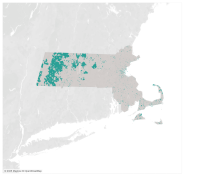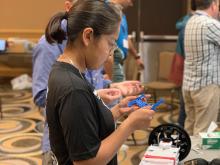
As a young woman of the Nuxalk Nation, Mallory Hans is “clearing a path for future generations.”
A 2022 graduate of the British Columbia Institute of Technology, she’s one of about 50 people hailing from various Tribes and First Nations across North America in attendance for the latest Tribal Broadband Bootcamp, a three-day intensive learning experience focused on building and running Tribal Internet networks.
Held in different tribal regions several times a year since the initiative began in 2021, this bootcamp (the eighth in an ongoing series of hands-on seminars) is being hosted at the Akwesasne Mohawk Casino Resort on the Saint Regis Mohawk reservation along the New York/Canada border.
“So far so good,” Mallory said on Day Two of the bootcamp just as the attendees broke into small groups to go through a variety of demonstration stations set up by bootcamp instructors and Tribal employees who run Mohawk Networks, which provides fiber-to-the-home (FTTH) Internet, video, and voice services across the reservation in northern New York.
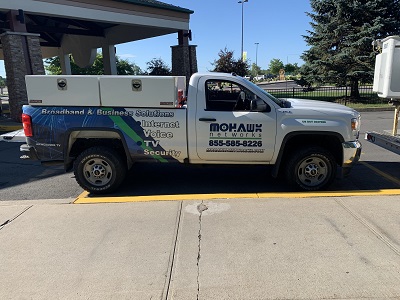
In continuing the driving impulse to demystify technologies and build capacity among cohorts in Tribal nations, Day Two was centered around fiber stations that included demonstrations of how network operation centers are run; one on fiber splicing; another showcasing equipment used to install fiber inside of households with representatives from Calix, and another station on the electronic equipment that measures the performance of fiber lines.
“I’m enjoying it, feeling more confident and finding out I’m capable,” said the 22 year-old, newly minted fiber technician.
Back home in British Columbia, Mallory works for CityWest, an Internet Service Provider (ISP) now in the process of building a fiber network in Bella Coola, an Indigenous community with a population of about 1,400 living on the banks of the Bella Coola River.
“My older brother is a carpenter and my Dad was a logger so I’ve always been into working with my hands,” Mallory said, explaining how up until two months ago she was working as a carpenter when CityWest encouraged her to join the ranks of fiber technicians working in the trenches to bring fiber connectivity to Nuxalk Nation.
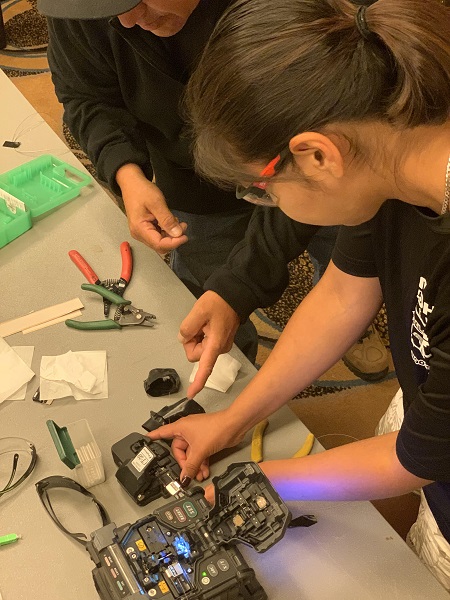
“The IT guy at our band office said he wanted me to come to this (bootcamp),” Mallory said.
Day One of the bootcamp began with introductions, learning how to crimp an ethernet cable, and an exploration of digital equity initiatives that focused, not on the infrastructure that is often lacking in Tribal areas, but on how Tribes are tackling other barriers to Internet adoption such as affordability and digital skills.
Day Two began the deep dive into how fiber networks are built and operated. “I’m excited for the fiber part. This is the part I’ve been waiting for,” Mallory said.
She said that beyond absorbing the hands-on technical knowledge, one of the best things about the bootcamp is the human network that is being cultivated, as Tribes with deep telecom experience help other tribes who are just now entering the space or trying to figure out how to build and operate their own networks, especially as the federal government is making historic investments to expand broadband access across Indian Country, which tend to be the least connected parts of the continent.
“It’s been really good learning about different communities and finding out how tribes are building networks. I never really thought that was anything we could do in Bella Coola but we’re doing it.”
Mallory’s experience is precisely what the bootcamps are designed to do. Organized and supported by a consortium of Tribal advocacy organizations and digital equity-focused groups that includes the Institute for Local Self-Reliance (ILSR), Connect Humanity, Michelson 20MM Foundation, Ford Foundation, the Network Startup Resource Center, and Google, the bootcamps are geared for Tribal citizens living in Indian Country with an expressed interest or focused commitment on improving broadband access.
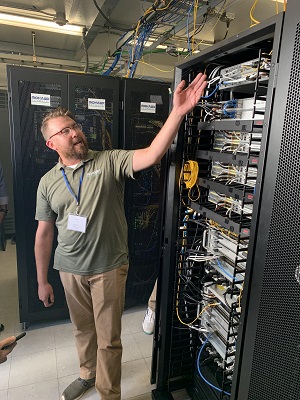
Participants do not need previous experience as everyone from broadband beginners to the more tech savvy are welcome.
Counting herself as a beginner, Ellen Sharpe, a member of the Mashpee Wampanoag Tribe from Cape Cod, Massachusetts, is the Tribe’s TERO officer and Broadband Project Manager. Along with four other Mashpee Tribe members on their broadband task force, Ellen came to the bootcamp to learn as much as she can in the wake of the Tribe having secured a $9.1 million NTIA grant to build a Tribal network.
“Here we are definitely getting more knowledge than we had and we were looking for this kind of training,” she said, adding that the know-how and relationships they are building through the bootcamp will serve her community well as the Mashpee tribe is currently sorting through bids from consultants to put together a high level engineering and design plan.
“We are excited about it but I’ll be even more excited when we build the network,” she said, explaining that their current thinking is to pursue a hybrid model, deploying fiber to tribal businesses and the Tribal Government Center, while providing fixed wireless Internet access to Tribal residents living in a recently built housing development.
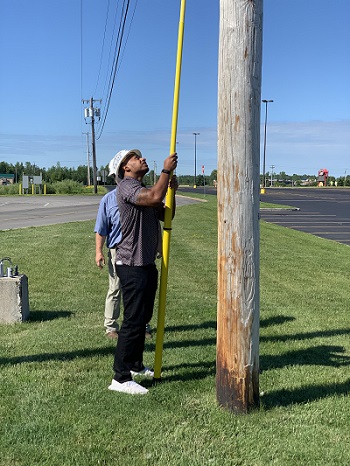
And while fiber is the gold standard of Internet connectivity, high-capacity wireless networks can also be a viable option, which is why on Day Three of the bootcamp attendees will immerse themselves in a day-long, hands-on session that covers the ins and outs of building a 2.5 GHz wireless network, how spectrum works, and sharing insights on network troubleshooting.
Tribal Broadband Bootcamp organizers say the bootcamps continue to evolve with the next one hosted by the Cheyenne River Sioux in Eagle Butte.
The bootcamps come at a fortuitous time as the National Telecommunications and Information Administration (NTIA) announced last week nearly $1 billion in new funding to expand access to high-speed Internet on Tribal lands.
The $980 million in this new round of funding is the last of the almost $3 billion allocated by the Biden Administration for the Tribal Broadband Connectivity Program. As reported by StateScoop, NTIA has so far awarded $1.78 billion to 191 tribal entities since the program launched in 2021.



